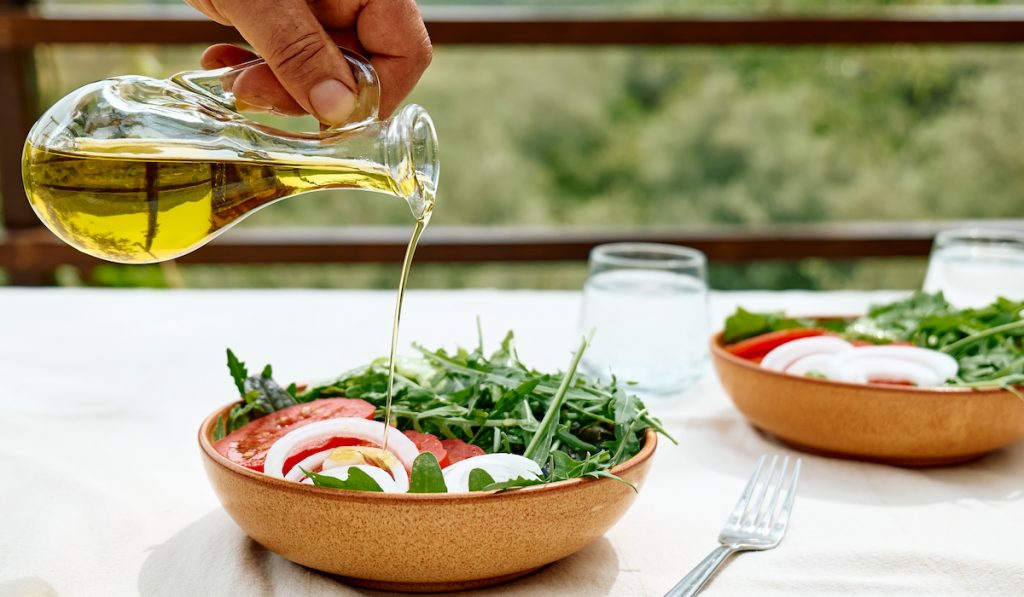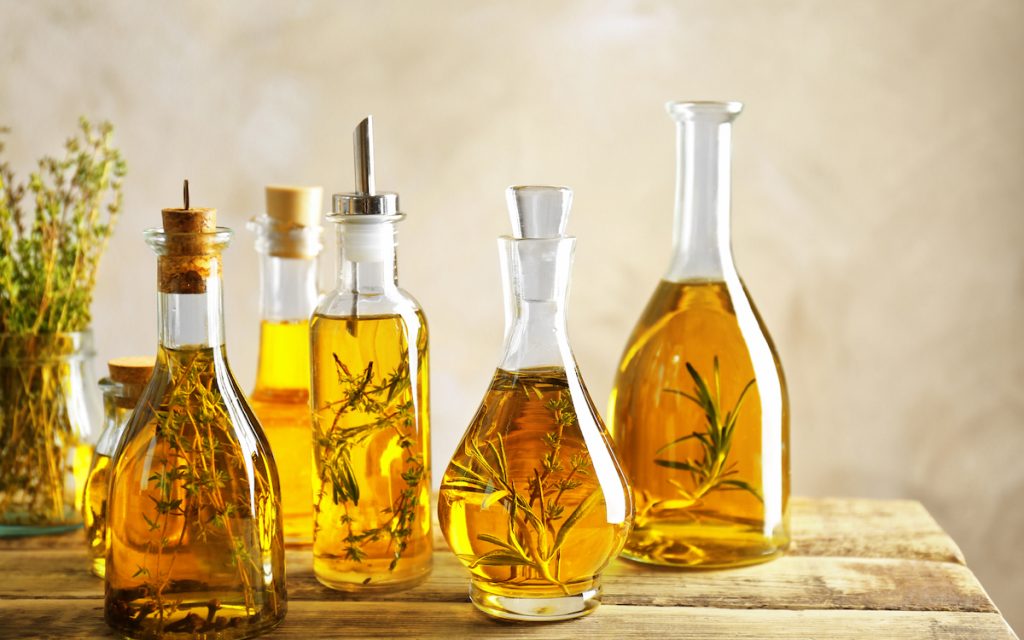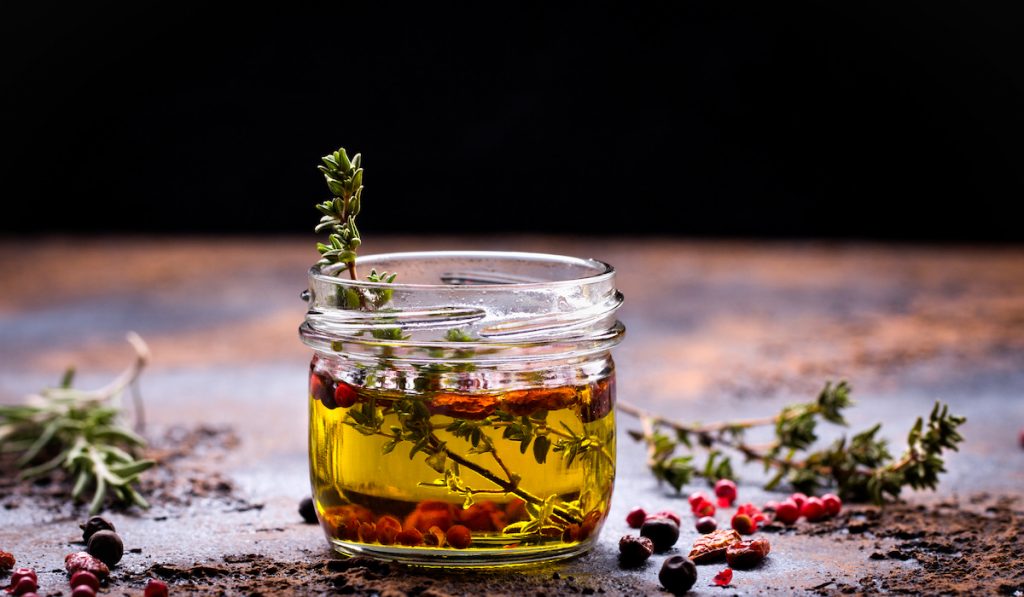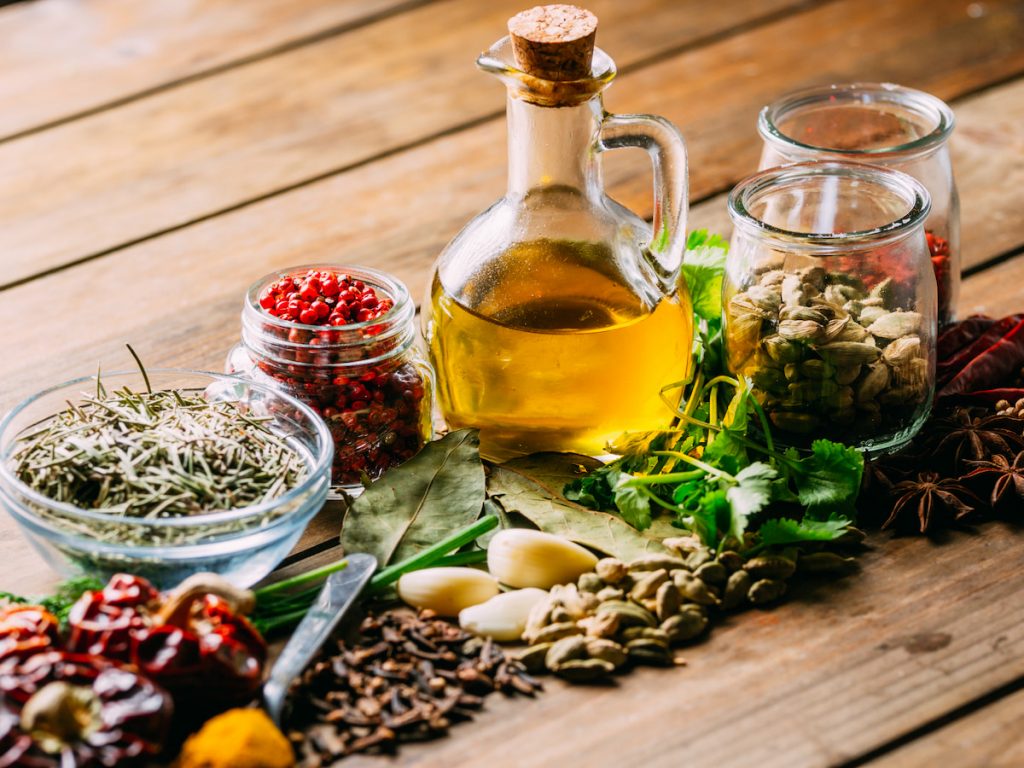Olive oil has been in use for thousands of years. Of course, one of its most common and maybe most satisfying uses is in cooking. It has also been popularized as being healthier than other types of cooking oil.
Olive oil comes in different forms: extra-virgin, virgin, refined, and pure olive oil.
The different types have varying levels of health benefits and also differing uses. The extra-virgin option, as you might guess, is the highest quality oil you can find.

Infused olive oils are useful in several ways ranging from cooking to skin and hair care.
These oils can be infused with herbs, citrus, spices, or whatever extra flavor you wish to add to your oil for the intended purpose.
The flavors add another level to the oil and make it even tastier. The good part is that you can impart those new tastes right in your home.
In this article, we discuss all you need to know about flavored olive oil. You will learn how to prepare high-quality infused olive oils while also discovering the best ways to store them. Let’s get started.
Table of Contents
How To Infuse Olive Oil With Herbs
There are steps to take and important tips to note when making an infused olive oil with herbs. They include the following:
Step 1
The foremost step is to acquire the necessary ingredients. The ingredients required are no more than a sizeable amount of fresh herbs of your choice, olive oil, and a jar to store the infused olive oil.
For the best outcome, it is preferable to get the best ingredients. Thus, be sure to get the freshest of herbs and the right type of oil.
Pure and light olive oil is highly recommended as it often gives a desirable outcome.
For the jar, you can use a jar or bottle of your choice. The most important thing to note here is to find one that has a good seal.
The container you choose should be airtight; it should have a rubber stopper preferably and should leave no room for the contents to escape.
Step 2
The next step is to wash and dry the ingredients, except for the oil, of course! The herbs should be washed and dried adequately to reduce the presence of bacteria on them.
You may also use fresh herbs without drying, but drying may be necessary to prevent botulism.
You should know that bacteria cannot thrive in the olive oil itself, but it can in the other ingredients. Thus, a mixture of these ingredients could lead to bacteria-infested oil.
To dry the herbs, you can lay them neatly on a tray and air-dry them for a minimum of 8 hours or overnight.
You may also use an oven to dehydrate herbs by wrapping them in parchment paper on a baking sheet and heating them at a low temperature for around thirty minutes to two hours until dry.
A dehydrator may also be used to dry the herbs by spreading them on the tray under 95 degrees until dry.
Step 3
The third step is the infusion of the dried herbs into the olive oil. Bruise the herbs before adding them to the oil.
Alternatively, you may crush them with a mortar and pestle or a blender before combining them with the oil.
There exist two different and available processes of infusion. They are cold infusion and hot infusion.
Cold infusion
Here, you put the herbs into the jar containing the oil and seal it. The sealed jar should be placed in a cool, dark place for two weeks to allow proper time for the herbs to infuse.
After that, the oil is sieved to remove the herbs and then is ready for use.

Hot infusion
In this method, the oil and herb mixture is simmered in a saucepan on medium heat for two to five minutes.
Afterward, the mixture is allowed to cool and steep for around two hours. Then it is sieved and stored in a jar.
Doing this helps to reduce the presence of bacteria to the barest minimum. This method is also a faster means of infusion as opposed to the cold infusion method.
However, the hot procedure could affect the quality of the olive oil.
How Long Does Infused Olive Oil Last?
Once prepared, the infused olive oil should be stored in a darkened, airtight jar and kept in a refrigerator as water, heat, and light are its biggest enemies.
If kept refrigerated, infused olive oil with dried herbs can last an average of one to three months.
Olive oil infused with fresh herbs can be kept refrigerated for up to two weeks.
If a refrigerator is not accessible, infused olive oil with dried herbs can be stored in a cool, dry place and can last for an average of 1-3 months.
How Can You Tell If It Has Gone Bad?
Infused olive oil can spoil after some instances of exposure. This is even more common when there is water in the mixture either from its preparation or afterward. Once that occurs, the infused oil might not last long and is best consumed within a few days.
In cases where the herbs were not sieved, once it appears that the ingredients inside the oil are showing signs of spoilage, the preparation should be discarded.

Can You Use Expired Olive Oil?
You can consume olive oil for about eighteen to twenty-four months after it has been bottled. The first one to three months describes the period when the olive oil is at its best. But that doesn’t mean you cannot use it after that timeframe.
Furthermore, since it is not perishable, you can use a purchased olive oil for a few more months after the expiry date written on the jar.
However, as time passes, the quality will be reduced, but it will not become redundant until it turns rancid.
Does Olive Oil Have To Be Refrigerated After Opening?
The use of airtight containers is to prevent air from freely getting into the jar. An infused olive oil is best kept in a refrigerated environment.
Thus, once the oil is being consumed, the presence of a cold storage environment is crucial.
Flavored Olive Oil vs. Infused – Is There A Difference?
Yes. There is a slight difference between the two terms. The flavored olive oil usually contains chemicals in the form of preservatives, food flavorings and colorants, and other additives.
Of course, flavored olive oil is also similar to an infused oil in that it has a particular taste. But they differ in their processing. However, you should note that the term ‘flavored oil’ is often used to refer to infused oils.

Ideas For Infused Olive Oil/Flavors
Just as there are different herbs and spices, there are many possible infused olive oils. While you may decide to have one herb infused in the oil, a mix of two flavors is not out of place.
The infused olive oil flavors you can try include:
- Fresh bay leaves
- Lemongrass and kaffir limes
- Lemon zest and thyme
- Ginger, garlic, and lemongrass
- Assorted peppercorns
- Chili infusion
- Rosemary infusion
What To Store Infused Olive Oils In
Without a doubt, the best containers in which to store your infused olive oil are made of glass. This is for two reasons. The glass bottles do not alter the taste as plastic bottles do. They are also aesthetically pleasing.
Some bottles you may consider for storing infused olive oils include:
- Aozita 17oz Glass Olive Oil Bottle - 500mL
- Olive Oil and Vinegar Dispenser Bottle
- Olive Oil and Vinegar Dispenser Glass Cruet Bottle
- Circleware Yorkshire Mini Glass Olive Oil and Vinegar Dispenser Bottles
- Tescoma Oil Dispenser Bottle with Infuser - 250mL
- Cornucopia Glass Oil and Vinegar Cruets
- Oil Sprayer Mister
Resources
- https://stamsons.com/pages/infused-vs-flavored
- https://www.secolarievoo.com/fused-vs-infused-olive-oil-whats-the-difference/
- https://www.theolivetap.com/blog/types-of-olive-oils
- https://www.thehealthsite.com/fitness/types-of-olive-oil-which-one-to-use-for-cooking-and-which-one-for-hair-and-skin-v0316-378411/
- https://foodal.com/knowledge/herbs-spices/make-beautiful-tasty-herbed-oils/
- https://www.countrycleaver.com/2013/02/how-to-tuesday-how-to-infuse-olive-oil.html
- https://www.thekitchn.com/fancy-flavors-how-to-infuse-ol-103225
- https://wildlyorganic.com/blogs/recipes/how-to-make-herb-infused-olive-oil-an-easy-natural-gift-idea
- https://www.farmdrop.com/blog/how-to-infuse-olive-oil-and-transform-your-cooking/
- https://onlyoliveoil.vas.com.sg/2017/02/does-olive-oil-expire
- https://www.sehat.com/expired-olive-oil-uses
